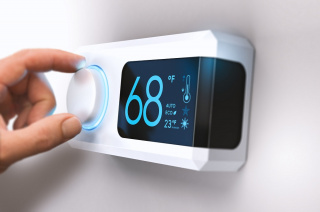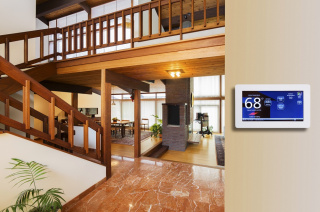Your HVAC system relies on a thermostat to signal when to run, whether you’re trying to cool or heat your home. When your thermostat doesn’t work correctly, your comfort suffers, but there are some other factors to consider in thermostat settings and features. Here are some different ways the thermostat will affect the overall performance of your heating and cooling system.
Thermostat Won’t Turn On
A thermostat that doesn’t show anything on the display and won’t turn on at all is clearly a problem because if the thermostat doesn’t run, your HVAC system won’t run.

In some cases, the thermostat’s display turns off simply because the battery dies. Many thermostats will display a small battery symbol when the battery is near the end of its life, so periodically check the thermostat to make sure the battery is in good shape. If a new battery doesn’t solve the problem, there could be other power issues to consider. There might be a fuse that’s blown or a problem with the wiring that’s preventing the thermostat from signaling the furnace or air conditioner to turn on. The problem might also be that there’s dust accumulated in the thermostat, which is blocking the signal. Compressed air or a rag can easily clean this out. If you’re unable to get the thermostat to start working, it’s a good idea to call HVAC repair in Hampton, GA.
Temperatures Don’t Match
Sometimes the temperature displayed on the thermostat is significantly different than the actual temperature in the home. When this happens, it’ll be impossible to get your home at a comfortable temperature, and you’re more likely to have higher utility bills as well. Sometimes this can be caused by lousy calibration, or it may be that part of the thermostat has simply gone bad. It’s important to double-check the location of the thermostat to ensure it’s not getting any drafts or direct heat or cooling from other sources that are affecting its ability to regulate your home’s temperature. HVAC service in Hampton, GA, can determine the actual difference in temperature to conclude whether or not the problem is actually with the thermostat.
The System Is Short Cycling
A malfunctioning thermostat will cause significant problems with your HVAC system’s efficiency because it’ll often cause it to short cycle. When the system is working properly, it’ll complete a full cooling or heating cycle in order to maintain the temperature set on the thermostat. However, when the thermostat isn’t working correctly, the signals will cause the furnace or AC to run for a short amount of time and then stop and start again. This is a problem not only because it won’t keep your home at a comfortable temperature, but it’ll waste energy and place additional wear and tear on your system. Recalibrating or replacing a faulty thermostat may put an end to this inefficiency.

How Upgrading Thermostats Can Help
Old thermostats can continue to work for many years and not necessarily cause your system to run less efficiently; however, an upgraded thermostat can boost efficiency. Programmable thermostats allow you to choose the temperature that’s set throughout the day so that you don’t waste energy on an empty house. A smart thermostat actually learns your family’s habits to increase efficiency and extend the lifespan of your system. Contact Omega Heating & Air today to have your thermostat evaluated and to learn about other options.


